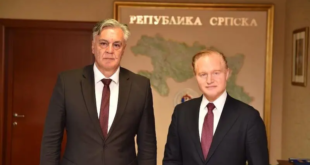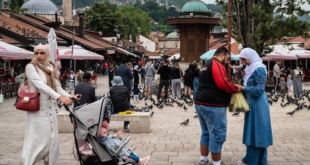Bosnians will head to the polls on October 3 in what has been described as a crucial post-war general election, with the outcome likely determining wether the country will move forward on its EU path or remain stuck in political deadlock.
Bosnia’s central electoral commission decided on Wednesday that the election will be held on Sunday, October 3, while the official pre-election campaign is to start one month prior to that.
However, the ruling ethnic leaders began heightening their rhetoric months ago, with Serbs threatening Bosnia’s disintegration, Croats calling for the country to be divided further along ethnic lines and Bosniaks (Bosnian Muslims) insisting on greater centralization.
The long-standing dispute about Bosnia’s future has already prevented implementation of the reforms seen as crucial for the country’s progress on its path to the EU membership.
Most recently, Bosnia failed to change its constitution to end discrimination against minorities before calling the polls, as was required by the European Court of Human Rights
Bosnia’s constitution, part of the Dayton peace agreement which ended the country’s 1992-95 war, allows only Bosniaks [Bosnian Muslims], Croats and Serbs, the three constituent peoples, to run for the parliament and the presidency.
Under the peace agreement, the country was divided into two highly autonomous parts – Serb dominated Republika Srpska and Bosniak-Croat federation. The two are linked by weak central institutions.
Serbs from the Federation and Bosniaks and Croats from Republika Srpska are also banned from running for the posts reserved for their respective ethnic groups in the central institutions.
Last December, the European Court of Human Rights ruled that Bosnia’s constitution discriminated against minorities by barring them from running for high offices based on their ethnic identity, and ordered that it be changed.
The binding decision was issued in response to a complaint filed by Dervo Sejdic, an official of an umbrella body for Roma in Bosnia, and Jakob Finci, Bosnia’s ambassador to Switzerland and the leader of the country’s Jewish community.
Following Wednesday’s decision by Bosnia’s central electoral commission, Finci told media that he was “deeply disappointed by living in and representing a country which does not fulfill its promises.”
“What I fear in particular is that the election results will not be recognised because we violate the international Human Rights Convention,” Finci said.
Bosnia’s failure to honor the court’s ruling prior to calling the election prompted the Council of Europe’s parliamentary assembly, PACE, to warn the country that the democratic legitimacy of the members of the presidency and deputies in the central parliament who will be elected on October 3 might be questioned.
The assembly also warned Bosnia that its failure to reform the constitution could lead to a number of measures being taken against it, including suspending its delegation from PACE or suspending its voting rights.
During her recent visit to Sarajevo the European Union’s foreign policy chief, Catherine Ashton, called on Bosnian voters to support leaders who can realize their dream to join the EU.
“I hope that in the election campaign, people will ask questions about the direction the country is travelling in and get from politicians answers about how… much progress has been made on the path toward Europe,” she said.
 Eurasia Press & News
Eurasia Press & News



